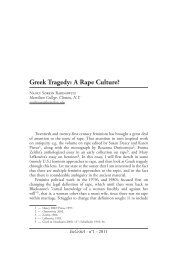Perspectives On and Of Livy's Tarpeia - EuGeStA
Perspectives On and Of Livy's Tarpeia - EuGeStA
Perspectives On and Of Livy's Tarpeia - EuGeStA
Create successful ePaper yourself
Turn your PDF publications into a flip-book with our unique Google optimized e-Paper software.
190 TaRa WeLCh<br />
uerbera uel intra pomerium, modo inter illa pila et spolia hostium, uel<br />
extra pomerium, modo inter sepulcra Curiatiorum (1.26.10-11).<br />
Meanwhile the old man embraced his son <strong>and</strong>, pointing out the<br />
spoils of the Curiatii fixed in that place which is now called the horatian<br />
Pillar, said, “Romans, you just saw this man honored <strong>and</strong> processing<br />
victoriously in ovation. Can you now bear to see him bound under the<br />
gallows <strong>and</strong> tortured with the lash? even alban eyes would scarce be able<br />
to bear such a hideous spectacle. Go, Lictor, bind the h<strong>and</strong>s which just<br />
recently took arms to secure imperium for the Roman people. Go, veil<br />
the head 52 of the one who liberated this city. hang him from a cursed<br />
tree, flog him within the pomerium, right there among the weapons <strong>and</strong><br />
enemy spoils he won, or outside the pomerium, among the graves of the<br />
enemy Curiatii he slew.<br />
The father’s emphasis on watching (uidistis...potestis uidere) hints<br />
that the spectators too are torn among divergent perspectives, if they<br />
can see young horatius triumph <strong>and</strong> fall with the same eyes. <strong>and</strong> he<br />
here addresses the onlookers as Romans, Quirites, but with the word<br />
most calculated to draw them closer to the albans, whom Livy has just<br />
named Curiatii; Not only does curiatii sound like Quirites, but Quirites<br />
indicates foreigners-become-Romans 53 . horatius thus pegs their identity<br />
down <strong>and</strong> then connects that identity to a Roman way of looking that<br />
hints at the equation between Roman Quirites <strong>and</strong> alban Curiatii 54 .<br />
his next comment further blurs the distinction between Roman <strong>and</strong><br />
alban by asserting some kind of universal perspective, for even alban<br />
eyes could not tolerate such a sight. The sight of horatius punished, even<br />
the potential of that sight, unifies the hostile people in a more subtle<br />
way than the overt conflict that had been resolved by the brothers. Thus<br />
the elder horatius draws family, Rome, <strong>and</strong> alba together into a unified<br />
perspective. Put differently, he exp<strong>and</strong>s Romanness <strong>and</strong> family <strong>and</strong> alban<br />
so that they are coterminous with each other, <strong>and</strong> all of this based on the<br />
visual perspective of each. This recalls the beginning of the alban conflict,<br />
in which the two sides hostile to each other were really more alike than<br />
different, each desiring war to further their glory but each putting forth<br />
52 — This is the archaic formula, but Cicero connects it to the language for veiling the bride.<br />
Cf. Cicero pro Rabirio perduellionis reo 13. This can be read as more gender-overlap, inasmuchas<br />
punishing the young horatius equates to making him into a bride.<br />
53 — see Maltby 1991: 517 sv. Quirites, which Livy 1.13.5 <strong>and</strong> varro DLL 6.68 derive from<br />
Curensibus, Tatius’ sabines. a commentator on Lucan 5.32 even connects curia with Curenses, thereby<br />
rendering the connection between Curiatii <strong>and</strong> Quirites even closer. see also devaan 2008: 510 sv.<br />
Quirites.<br />
54 — similarly, the proximity of the tigillum sororium to the shrine of Janus Curiatius also links<br />
the Quirites <strong>and</strong> Curiati. Janus is, of course, a god who emphasizes plurality of perspective.



